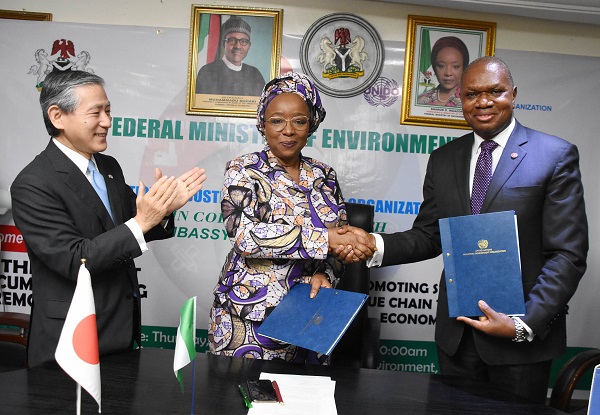
Nigeria has signed a tripartite agreement with Japan and the United Nations Industrial Development Organisation (UNIDO) on sustainable plastic waste management to boost Nigeria’s circular economy.
Speaking at the signing ceremony of the project “Promoting Sustainable Plastic Value Chain Through Circular Economy Practices” in Nigeria, today (February 10) in Abuja, the Minister of State for Environment, Barr. Sharon Ikeazor, said the $3 million project billed to run from 2022 to 2025 will help Nigeria manage plastic wastes properly to boost economic development.
“Nigeria, with a population of over 200 million people generates about 32 million tonnes of solid waste per year, of which 1.15million tonnes are plastic wastes, with little or no segregation is illegally dumped in open spaces including drainages or disposed of with hazardous wastes such as health care wastes in dumpsites and burnt openly with an estimated 340 thousand tonnes ending up as marine litter. These unwholesome practices have been linked to perennial flooding across the country, increased respiratory and cardiovascular diseases, increased incidences of cancer, loss of aquatic life, loss in agricultural productivity, etc.
“The large volume of plastic waste being generated in the country presents circular economic business opportunities across the plastic value chain which should be properly harnessed for job/wealth creation, the establishment of micro, small and medium scale enterprises, private sector investment including foreign direct investment in addition to preventing/reducing plastic leakages to the environment. Therefore, the ministry has taken proactive measures to promote, institutionalise and entrench sound circular economy principles and practices in the country,” she said.
Ikeazor added that the project would therefore complement government’s effort in mainstreaming circular economy principles and practices into the national development plans.
“Nigeria’s circular economy potentials can be seen in its large and thriving waste management sector that attracts operators due to the high volume of wastes and demand for recycled materials. One of the ways to realise this potential is to support the industry by demonstrating the benefits of adopting circular economy practices with innovative technologies, including recycling technology or alternative material production.
“This is exactly what this project whose objective is to promote the integration of circular economy principles and practices into plastic waste management, strengthen plastic value chains, demonstrate the benefits of adopting circular economy practices and resource-efficient production of plastic value chains in Nigeria, is designed to achieve,” she added.
In his remarks, the UNIDO representative and regional director, Nigeria regional office hub, Mr. Jean Bakole, explained that the project which originated concretely from the project: “Studies available sustainable alternative materials to plastic and innovative packaging and recycling technologies that meet market needs in Africa to reduce plastic leakages into the environment” collaboratively carried out by UNIDO and the government of Japan will help in the economic and social development of Nigeria.
He said the project, funded by the government of Japan, to be implemented by UNIDO and Nigeria through the Ministry of Environment, would focus mainly on Lagos and the Federal Capital Territory (FCT), Abuja.
“Through the project, we also hope to develop national and states’ implementation guidelines for the National Policy on Plastics Waste Management, strengthen recycling value-chains in selected municipalities in Lagos, FCT and technology demonstration of circular economy and resource efficiency practices,” he added.
Earlier, the Ambassador of Japan to Nigeria, Matsunaga Kazuyoshi, said Japan is committing $3m to the government to promote a sustainable plastic value chain through circular economy practices because of its commitment to promoting a better eco-system, stressing that what affects Nigeria affects Japan, too.
He restated that Japan hopes to contribute to the development of the blue economy, as well as the prosperity of Nigeria, adding that it plans to achieve this through the multi-faceted project of contribution to environment conservation and contribution to the new economic growth.


